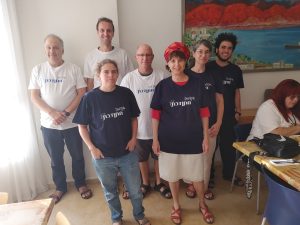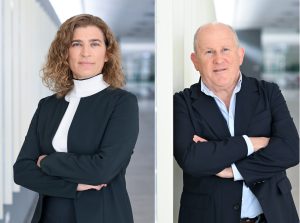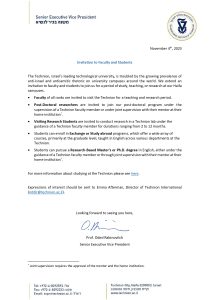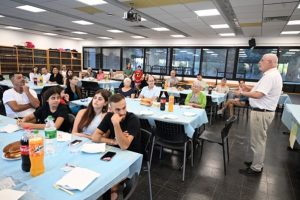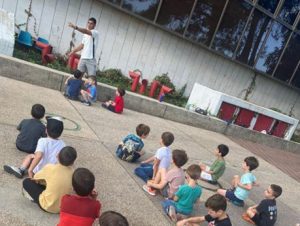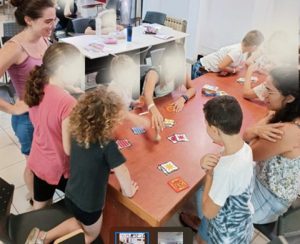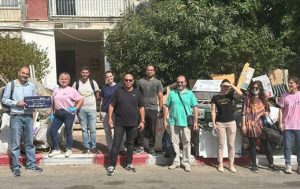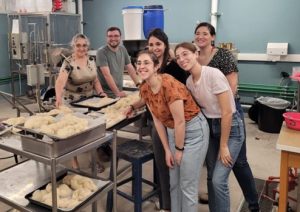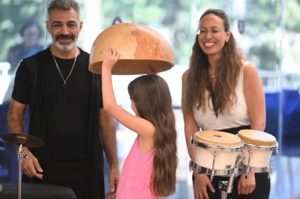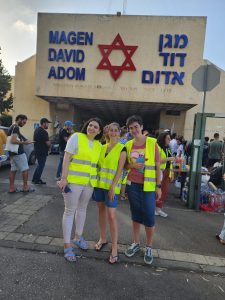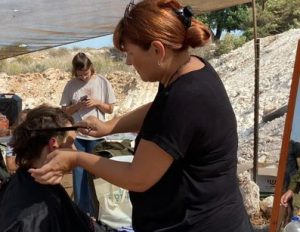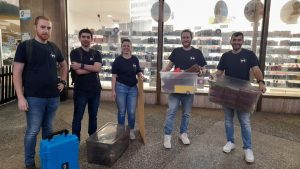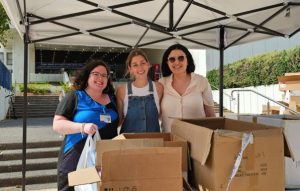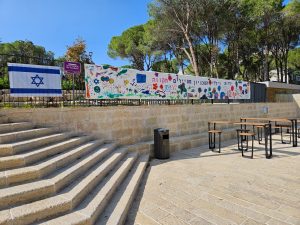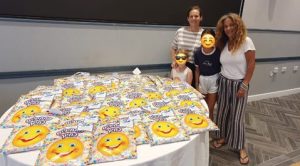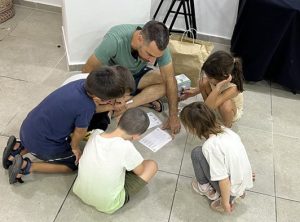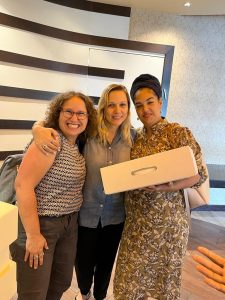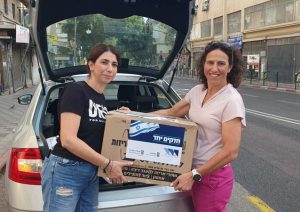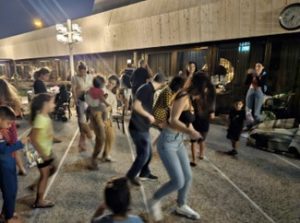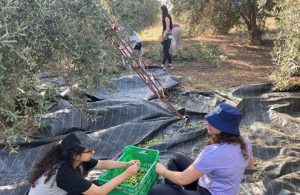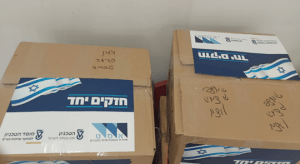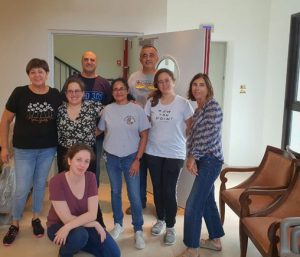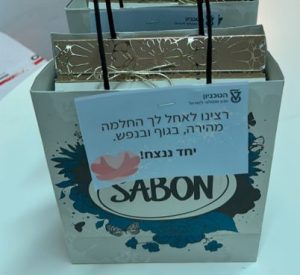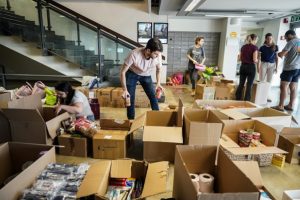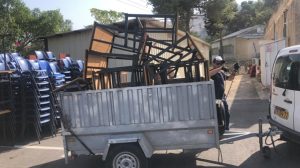Author: shelleys
Spreading Light Through Teaching
More than 250 volunteers from the Technion mobilized to help teach students who were evacuated from their homes
About a week after the outbreak of the war, in mid-October, Prof. Yohai Carmel from the Faculty of Civil and Environmental Engineering came across a volunteer academy project . This new and exciting initiative is designed to harness members of the academic and administrative faculty, doctoral and master’s students to assist in the teaching of students evacuated from the north and south during the war and to support them. Prof. Carmel contacted the originator of the initiative, Dr. Lev Talor from Ariel University, and offered to help not only with the teaching but also with the organization.
Following this, Prof. Carmel is currently coordinating the initiative in the Northern District. Meanwhile, Dr. Ronit Cohen, director of the Ecology Laboratory at the Faculty of Architecture and Urban Planning, has taken it upon herself to coordinate the activity in the Haifa District. In cooperation between them and Michal Meir, who coordinates the “Mutual Guarantee” initiative at the Technion, an email was sent to all Technion faculty members, and as a result, many academic faculty members and managers from the Technion volunteered for this initiative. According to Prof. Carmel, “More than 500 volunteers are currently registered in the ‘Volunteer Academy’ in Israel. Happily, the Technion leads by a margin over all other academic institutions, with more than 150 volunteers.”
The students at the Technion also joined the teaching effort, and this initiative is led by Amit Pelati, a master’s student at the Faculty of Science and Technology Education who works at the Center for the Advancement of Teaching and Learning at the Technion. “So far, about 120 students have volunteered to teach math, science and English,” he says. “I am working on the connection between the volunteers and the temporary schools set up for the evacuees in hotels (for elementary schools) and colleges (for high schools). It is very complex, because things are very dynamic. It happens that we arrange for a student to volunteer at a temporary school – and the next day we receive an update that there is no longer a school there. These are huge numbers: thousands of evacuees from the north are in temporary places in Haifa, Karmiel and around the Sea of Galilee, apparently for a long time, and assistance to the educational teams is really essential these days.”
The main volunteering within the “Volunteer Academy” is in the schools, but many also volunteer in learning centers that operate in the afternoon. In the supplementary learning center at the Hof Guy Hotel in Kinneret, for example, volunteers are Prof. Yizhar Or from the Faculty of Mechanical Engineering, the Dean of the Faculty of Materials Science and Engineering Prof. Giti Frey, Dr. Yosef Frey, Dr. Moran Benhar from the Rapaport Faculty of Medicine. The learning center is attended by students from the evacuated schools of kibbutzim and moshavim in the Nahariya area, which were integrated into the Kaduri High School.
Prof. Carmel himself teaches science in grades 8-10. According to him, “I don’t stick to the curriculum but try to be interesting and relevant for them. Even so, it is difficult for them to concentrate on their studies during this period, after they were displaced from their home and moved to live in a temporary hotel, for an unknown period of time.”
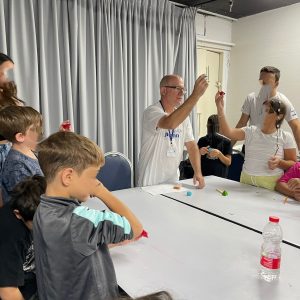
Supporting Reservists (Final Exam Exemptions and Make-Up)
The Technion is exempting students serving in the IDF reserves for significant amounts of time from taking scheduled final exams for spring and summer 2023 classes
The Technion is enabling students who served extensively in the army reserves during the current war to receive exemptions from regular and make-up final exams for classes they took in the spring and summer semesters of 2023. These exemptions, combined with other benefits the Technion has already announced on behalf of students in the reserves, will allow them to begin the new academic year as smoothly as possible. These benefits include a NIS 6,000 grant for each student serving in the reserves, as well as exemption from paying dorm rent, Emotional support and more.
Since the start of the war thousands of Technion’s students received emergency call-up notices, as did many faculty members and academic and administrative staff. Exempting reservists from the need to take exams from last year’s courses will enable them to complete their military duty and return as quickly as possible to their studies at the Technion. Due to the special nature of the studies at the Technion and the disciplines taught at the university – engineering, medicine, science, architecture, and education – a small number of make-up exams for courses defined as crucial for the students’ professional and academic training will not be exempt. Moreover, the exemption does not include the obligation to submit projects and assignments. However, it does include students who are parents and whose partner is serving in the reserves, as well as members of the “Atudaim” program who were mobilized, and students in mandatory service and in the standing army who meet the criteria mentioned above.
Make-up exams for the spring semester and final exams for the summer semester will take place at the Technion from December 17, 2023, through January 5, 2024. Since the war interrupted the original exam schedule and some students are required to complete their exams before the start of the new semester, the Technion announced a special plan for additional academic adjustments for students serving in the army reserves during the war. As a result, the remaining exam period for the last academic year will be separated from the upcoming academic year and there will be no overlapping between the two. This change, along with the exemptions for reservists, will enable all students to begin the new academic year without worrying about lingering obligations from previous years.
“At the Technion, we are very proud of our students who are serving in the reserves and pray for their safe return,” says Technion President Prof. Uri Sivan. “We understand that given the situation and the ongoing war, the students serving in the reserves are experiencing long periods of mobilization with a great deal of challenges, which makes it especially difficult to return to academic life and to exams. Therefore, already from the beginning of the war, the Technion’s management started formulating a series of adjustments to relieve some of the pressure for all students, and especially for those serving in the army during the war. The adjustments for the exams and for the beginning of the academic year will make it possible to open the winter semester at the earliest feasible date, so that we will be able to proceed with a balanced academic year as much as possible.”
Students who served in the reserves for at least 30 days between October 7, 2023, and the start of the exam period are eligible to be exempted from taking exams for the spring and summer semesters of 2023. These students can choose to receive an exemption for classes for which they were supposed to take exams between December 17, 2023, and January 5, 2024. The “exemption” mark is intended to replace the grades of make-up exams. Students who wish to do so can forego the exemption option and can take make-up exams during their scheduled “moed bet” or “miluim” times.
Admissions for Overseas Medical Students in the Reserves During the War Under Order-8
The Forum of Deans of Medical Faculties in Israel, including Prof. Eli Pikarski, the dean of the Faculty of Medicine at @HebrewU, has developed a framework for the admission of students studying medicine abroad, conscripted to the IDF under Order 8, who are unable to resume their studies. This initiative acknowledges their contributions and aims to mitigate any disruption they may face.
After extensive deliberations, the forum has outlined criteria allowing for the integration of these students into medical faculties in Israel as early as the upcoming academic year of 2023-2024. To implement this plan, a national admissions committee has been established, comprising representatives from all medical faculties in Israel. This committee will review applications and determine the number of accepted students based on each faculty’s capacity to accommodate additional students.
It’s important to highlight that securing full state funding is a prerequisite for executing this framework.
For comprehensive details on the outline, candidacy criteria, and specific conditions, please refer to the full document attached below.
Interested candidates can submit their applications, along with the required documents, to the following email address: VERA.refua@gmail.com
Furthermore, the deans’ forum has decided to extend recognition to candidates enrolled in medical studies this year (2023-2024) who were also conscripted to serve in the IDF under Order 8 on October 7, 2023. These individuals, having completed the entire medical admission process but falling short of a few points for admission, will also be considered. A limited number of these candidates will be selected promptly, with details announced separately.
Please see the attached document for the full announcement text.
New Members of the Technion’s Management
The position of Executive Vice President for Research has been divided in two: from now on, there will be an Executive VP for Research and an Executive VP for Innovation and Industry Relations
The Technion’s Council, supported by the Senate, has confirmed the appointments of Prof. Noam Adir to the position of Executive Vice President for Research and Prof. Lihi Zelnik-Manor to the position of Executive Vice President for Innovation and Industry Relations.
The new appointments reflect the Technion’s strategic policy of strengthening the ties between academia and industry – as a result of the intensification of research in industry and the understanding that collaborations between academia and industry are a significant force multiplier for research and development, impacting student education and training. In recent years, as part of the strategy of lowering the barriers separating academia from industry, the Technion’s management has expanded the university’s activities related to implementing research, commercializing new technologies, and founding start-up companies. During the last three years, the number of companies founded by Technion faculty members and graduate students tripled. In fact, one of every 30 new start-up companies in Israel is now founded by a Technion researcher.
As a result of these important changes, the role of Vice President for Research has been divided into two positions. The Vice President for Research will deal with all aspects of research at the Technion, including facilities, foundations, grants, national and international research committees, etc. The Vice President for Innovation and Industry Relations will oversee the transfer of knowledge and technologies developed at the Technion to industry, including identifying the research requirements within industry, collaborative research, and commercializing the knowledge.
Prof. Noam Adir, the incoming Vice President for Research, served as the Dean of the Schulich Faculty of Chemistry, as well as Deputy VP for Research and Deputy VP and Director General for Safety. Prof. Adir joined the Technion’s faculty in 1995. His research focuses on physical tools in the chemical research of molecules and biological systems and the development of innovative techniques to harvest solar energy. In his new role, Prof. Adir will also serve as CEO of the Technion Research & Development Foundation Ltd., a subsidiary of the Technion.
Prof. Lihi Zelnik-Manor, the new Vice President for Innovation and Industry Relations, served as Vice Dean of the Viterbi Faculty of Electrical and Computer Engineering. Prof. Zelnik-Manor has been a member of the Technion’s faculty since 2007. Her field is computer vision, and she is deeply involved with industry and innovation. She served as General Manager of the Alibaba R&D Center in Israel for three years. In her new role, she will also serve as Vice CEO of the Technion R&D Foundation Ltd., responsible for T3 (the commercialization unit), the Institute of Metals and the Legal Unit.
Technion President Prof. Uri Sivan congratulated Prof. Noam Adir and Prof. Lihi Zelnik-Manor and wished them success in their new roles. In addition, he thanked the departing Vice President for Research, Prof. Koby Rubinstein, who held the position for four years. During Prof. Rubinstein’s tenure, a great deal of progress was achieved boosting ties between the Technion and industry. The President thanked Prof. Rubinstein for his leadership and dedication during a period that was very challenging for research and development.
e for photos
Captions:
- Prof. Lihi Zelnik-Manor
- Prof. Noam Adir
Photos: Rami Shelush, Technion spokesperson’s office
For more information: Doron Shaham, Technion Spokesperson, +972-50-3109088
Toward the discovery of new quantum phenomena that have yet to be observed
Prof. Ido Kaminer of the Viterbi Faculty of Electrical and Computer Engineering won an ERC Consolidator grant from the European Research Council.
ERC Consolidator grants support select scientists who propose pioneering, ground-breaking research ideas. The grant will be used by Prof. Kaminer’s research team to develop a theory and innovative experimental platform for a new field in electron microscopy: Q-in-PINEM. The research will focus on creating new quantum states and identifying unique quantum properties for materials.
“The goal of the project is to research new quantum phenomena that haven’t been observed and access them for the first time thanks to our ability to control the wave properties of free electrons,” Prof. Kaminer explains. “We are planning to produce the first-ever many-electron entangled states and measure the quantum correlations produced on extremely short periods of time, occurring for electrons moving at a big fraction of the speed of light.”
The physics of free electrons is a field that has been studied for many years and has already led to many applications such as microwave ovens, particle accelerators, and free-electron lasers. However, breakthroughs by Prof. Kaminer’s research group prove that even in this old/established field, there is still a great deal to be discovered, and in recent years his team made new discoveries and unprecedented observations involving the interaction of material, light and free electrons.
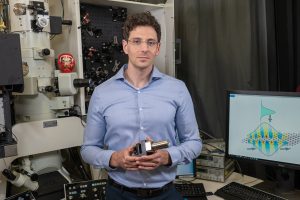
This month, Prof. Kaminer was also awarded the Lem Prize, named for the science fiction author Stanislav Lem. The Lem Prize is awarded annually to a young researcher whose creative work in science or engineering has the potential to positively impact the future of civilization. Stanislav Lem, who wrote classic novels like Solaris, is considered the Polish writer who is the most famous around the world. The prize in his honor was established two years ago to mark 100 years since his birth, and it is dedicated to the principal aspects of his literary heritage: human beings, science, technology, progress and the future. Prof. Kaminer is the third scientist to win the prize.
Prof. Kaminer pursued all of his academic degrees at the Technion: a double B.Sc. in Electrical Engineering and Physics and a Master’s and PhD at the Department of Physics under the supervision of Distinguished Prof. Moti Segev. He joined the Technion’s Viterbi Faculty of Electrical and Computer Engineering in 2018, following a post-doctoral fellowship at MIT, and established the AdQuanta Lab in the Faculty. Prof. Kaminer is a member of the Russell Berrie Nanotechnology Institute (RBNI), the Helen Diller Quantum Center, and the Solid State Institute.
In 2020, Prof. Kaminer made the list of TheMarker’s Most Promising Young People. In 2022, he won the $2.5 million Polymath Prize awarded by the Schmidt Futures Foundation to “outstanding people who are improving the world.” He also won the Lomb Medal, Krill Prize, Blavatnik Award, and other prizes bestowed by the Israeli Physics Society and the American Physical Society.
Look Them in the Eyes – Bring Them Home
This morning, the Technion hosted a rally to support the release of the abductees and to show solidarity with their families. Displayed prominently on the Elishar Central Library at the Technion were photographs of the abductees, accompanied by the caption: “We must bring them home now – #BringThemHomeNow.”
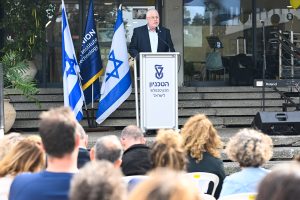
The rally, attended by the Technion’s administration, along with hundreds of students, administrative, and academic staff, was MC’d by Prof. Lihi Zelnik-Manor of the Viterbi Faculty of Electrical and Computer Engineering. She stated, “Forty-seven days have elapsed since that fateful and horrific Shabbat, a day that has forever changed us. During these forty-seven days of shock and mourning, our thoughts have constantly been with the murdered victims and the hundreds of abductees forcibly taken to Gaza. This rally and the exhibit at the Central Library serve as a reminder to ourselves, the Technion community, the citizens of Israel, and the entire world that abducting civilians violates not only legal but also moral principles.”
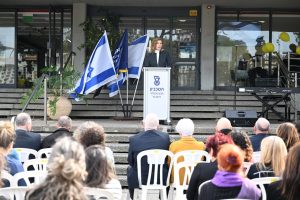
Prof. Uri Sivan, President of the Technion, addressed the rally, saying, “This event is not just ‘another round of fighting’ in the Israeli-Palestinian conflict, but a heinous crime against humanity perpetrated by terrorists who have forsaken their humanity. The barbaric acts of these murderers will be indelibly recorded in Jewish history, alongside the Holocaust, and will be forever etched in the hearts of all civilized people. These acts must be recognized for what they are – unforgivable crimes against humanity.”
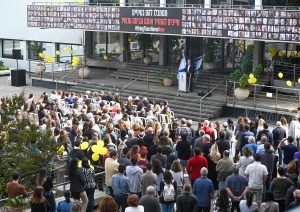
“We are all deeply saddened and grieving, yet among us are those who have been personally affected by this tragedy – the families of the murdered, the abducted, and the wounded. These are parents, children, siblings, and friends. As a parent and grandparent, I can only begin to fathom their anguish. Yet, none of us can truly understand the anxiety, worry, and yearning that keeps them awake, haunting every moment. Our hearts go out to them. We look into their eyes and into the eyes of the other abductees and their families, vowing that we will not rest until each abductee is safely returned to their loved ones.”
Technion Update
Shalom,
In light of the Home Front Command’s instructions, which remain unchanged, the activities tomorrow, Tuesday, 21.11.23, will continue as planned.
On Wednesday, November 22, 2023, at 11:30 AM, we will gather to advocate for the release of the abductees. This event will be held at the Central Library Square. Due to the Home Front Command’s regulations on public gatherings, registration is required to participate.
Please register at the following link: https://forms.office.com/r/grhJBL05tH
Wishing you a pleasant evening.
Message from the Heads of the Research Universities
Israel’s research universities continue to stand strongly with those serving in the army, as well as their partners, and offer them and all Israelis assistance and support through a myriad of local and nationwide initiatives.
In order to support the community of students – which includes army reservists and their partners – as well as residents of the conflict zones who were evacuated from their homes, and families whose loved ones were murdered, kidnapped, or injured, the heads of the research universities have announced that the start of the academic year will be postponed until reservists start to be demobilized, and not earlier than December 24, 2023. The two weeks prior to the start date will be devoted to preparations and assistance with returning to a normal academic routine.
This message applies to the following seven research universities: The Hebrew University of Jerusalem, Tel Aviv University, Bar-Ilan University, Ben-Gurion University of the Negev, Technion – Israel Institute of Technology, Haifa University, and Ariel University.
Different arrangements apply to the Weizmann Institute of Science and the Open University. Those institutions will communicate any relevant information directly to their students.
Following a request from the Ministry of Health, and in order to ensure continuity in Israel’s healthcare system, special arrangements will be made for medical students engaged in clinical studies.
Our goal is for the academic year to proceed as a complete year, with two full semesters. If necessary, the academic year will spill over into the summer. Specific decisions about the structure of the academic calendar will be made separately by each university.
The Technion Wants You!
Israel’s just and unavoidable response to the massacre of October 7th spawned a wave of anti-Israel and antisemitic protests around the world. These vile reactions are based on denialism and false information about the horrible crimes committed by the Hamas terrorists against babies, children, adults and the elderly.
“Unfortunately,” says Technion President Prof. Uri Sivan, “faculty members from many universities in the West joined this wave, as did student organizations and professional associations. Given the feeble responses of quite a few presidents of leading universities in North America, Europe and Australia, many Jewish and Israeli students and researchers currently face physical and verbal threats that cause them to think twice about everything they do and prevent them from participating in academic activities in those institutions. As a result of this situation and given the Technion’s important role in the history of the Jewish People during the last 100 years, we have announced a program for the rapid integration of students and faculty members from around the world looking for an academic refuge during these difficult times.”
Last week, the Technion published a Call for Proposals inviting faculty and students from around the world to join the Technion and pursue their studies, teaching and research activities on the Technion’s campuses in Haifa.
- Faculty members (all ranks) are invited to come to the Technion for a period of teaching and research.
- Researchers with a PhD degree are invited to join Technion’s post-doctoral program under the guidance of Technion faculty or joint guidance with a mentor from their home institution.
- Students are invited to join research projects in Technion’s labs under the guidance of Technion faculty for a period of two months to a year, by joining the Student Exchange or Study Abroad programs that offer a wide range of courses, mainly for graduate degrees. These courses are taught in English in numerous Technion faculties.
- Suitable students are invited to apply for a full research degree (Master’s or PhD) under the guidance of Technion faculty or joint guidance with a mentor from their home institution.
The Technion has already received a number of inquiries from students and faculty interested in this opportunity.
“The Technion will continue to serve as a supportive and safe research university for everyone,” summarizes the President of the Technion, “and I invite undergraduate and graduate students and faculty from all over the world to join us during this difficult time, and to be part of our academic community at the forefront of global research and education.”
The Technion at its Best
Right after the outbreak of the war, a “Give Help, Get Help” was established at the Technion to assist the Technion community and their families, the residents of Israel’s border towns, and the IDF soldiers. Dozens of initiatives now operate under this framework, in addition to a broad range of activities by ASAT volunteers. Here is a sampling of their activities:
Hosting on campus: Dozens of internally displaced people, families and individuals, are staying on campus. On their first Shabat dinner here, Technion President Uri Sivan was there to welcome them.
Taking care of Technion’s children: With schools closed, the Human Resources Department and the workers’ unions opened a daycare on campus for pre-school and primary school-aged children. The daycare was active until schools in Haifa reopened.
Also in Rambam: Students from the Ruth and Bruce Rappaport Faculty of Medicine volunteered at the daycare center for workers’ children in Rambam Health Care Campus.
Everything you need: The Technion’s second-hand shop provides evacuees with everything they need, free of charge.
On the Home Front: Students from the Faculty of Materials Science and Engineering helped clear out bomb shelters in Nesher, as part of the “Shelter City” initiative. Students from the Wolfson Department of Chemical Engineering, led by the faculty dean, cleared shelters in Haifa.
Challah Engineering: Members of the Faculty of Biotechnology and Food Engineering rolled up their sleeves, quite literally, and set to baking 300 challahs (so far) for reserve servicemen.
Shabat shalom: Technion staff members baked challahs for the displaced families staying on campus.
Music helps: The Department of Public Affairs organized a musical meeting to offer the families staying on campus a relaxing afternoon.
Part of the blood drive: Students Sivan Schwartz and Nohar Marcus organized a large group of students to assist at blood donation points.
Shave and haircut: Yara Tzachen, the hairdresser at the ASAT hair salon, went out into the field to offer soldiers free haircuts.
Education goes on: Technion Youth Program Centre organized activities for children evacuated from southern border villages, who are now staying at the Dan Panorama hotel in Haifa.
Giving: Students from the Ruth and Bruce Rappaport Faculty of Medicine organized a donation collection center for soldiers and for families from the Gaza Envelope.
Painting hope: children from the Na’amat preschool made large paintings, hung around the campus.
Nurseries needed: Faculty members from the Biotechnology and Food Engineering Faculty helped establish a nursery in Eilat for toddlers evacuated from the Gaza Envelope villages.
Fun Panorama: Technion volunteers organized activities for the displaced children staying at Dan Panorama hotel in Haifa.
Computing a way forward: computers were donated to displaced children.
Packed joy: Technion volunteers made packages of toys, books (donated by the central library), crafting materials, stationery, and more, for displaced families.
Just dance: Amnon Vilinger from the Andrew and Erna Viterbi Faculty of Electrical and Computer Engineering and Sapir, a SAP instructor, gave displaced families a dance lesson.
Bringing in the harvest: as the farming sector lacks working hands, hundreds of volunteers, students, faculty and staff, go out to help farmers bring in the harvest and prepare for new planting.
Packaged with love: many items have been donated, packed and sent to displaced families through ASAT’s donation center.
A room with a view: Technion workers helped clean and order rooms in the Lev Chash Association’s Home for Cancer Patients, to house now the families of the wounded.
Visiting the wounded: gift packages were prepared and given out in the Haifa hospitals.
One heart: various equipment has been collected and sent to soldiers, with the help of “One Heart” organization.
New classroom: thanks to a donation of 30 desks and 60 chairs from the School of Practical Engineering, a classroom was built for the displaced children housed in Dan Panorama hotel.
Comfort food: in the first days of the war, the businesses of the Student Union Building’s food gallery sent packaged meals to the assembly areas in the north and the south.
Laundry’s on us: ASAT provided displaced families staying on campus with cards for free use of all the washing and drying machines in campus dormitories.
Not a dull moment: ASAT organized afternoon activities for displaced children in the Student Union’s building.
Squeaky clean: “Give Help / Get Help” volunteers are doing the laundry for displaced families staying in hotels.
Staying with the children: “Give Help / Get Help” volunteers are also babysitting for reservists’ families.
For our soldiers at the front: a large group of academic reserves at the Technion volunteered to pack field rations, make bulletproof vests, and more.
For the soldiers: Human Resources Department sent gift packages to Technion students, faculty and staff called up for reserve service.
A big thank you to all of you! Your commitment is heartwarming. If we forgot an initiative, please email us and we’ll add it.
Technion Update
Good evening,
- In view of the current assessment of the situation, which remains unchanged, the Technion campuses will continue to operate under the emergency routine established over the past week. We are adhering to the Home Front Command’s guidelines and are allowing flexibility for remote work, subject to approval by supervisors as necessary.
- This week, our various academic departments and units will complete emergency drills for accessing protected areas, under the guidance of the Security and Emergency Unit. Please be aware of the drill schedules in your building.
- The Department of Biotechnology and Food Engineering, in collaboration with the Mutual Responsibility Center and with the support of numerous Technion staff volunteers, prepared, packaged, and delivered approximately 300 parcels of challah and cakes to our reserve soldiers in celebration of Shabbat. We commend everyone involved!
- Next week, we will continue to focus on activities that foster social engagement. The Mutual Responsibility Center remains open for ongoing volunteer opportunities. For more details, visit (Hebrew): https://technion.my.canva.site/
- The Office of the Dean of Students has established the “Technion Resilience Center” under the Center for Student Counseling and Support. This center offers professional assistance to students dealing with stress, emotional challenges, and academic preparation. We encourage you to reach out to us at 077-8874112 or via email at counsel@technion.ac.il.
Wishing you all a great week ahead


